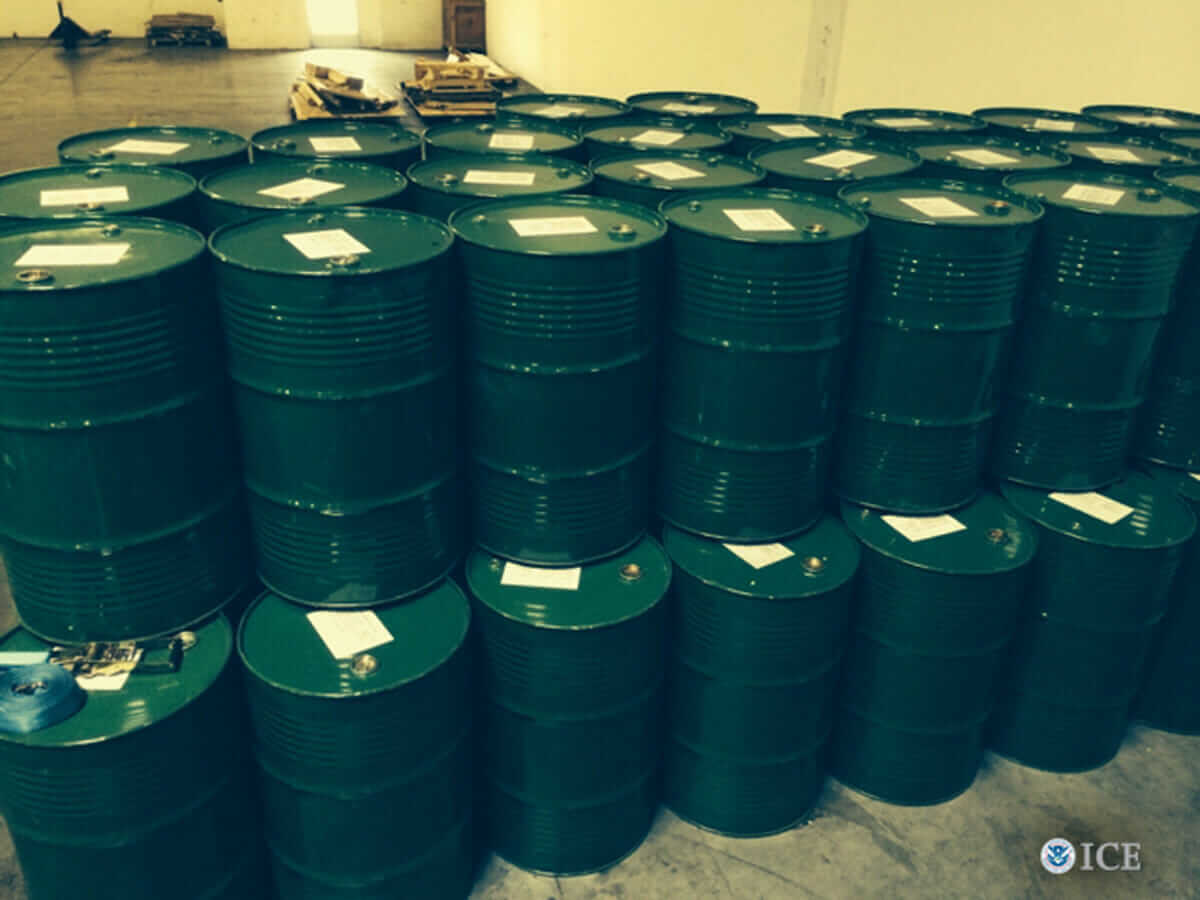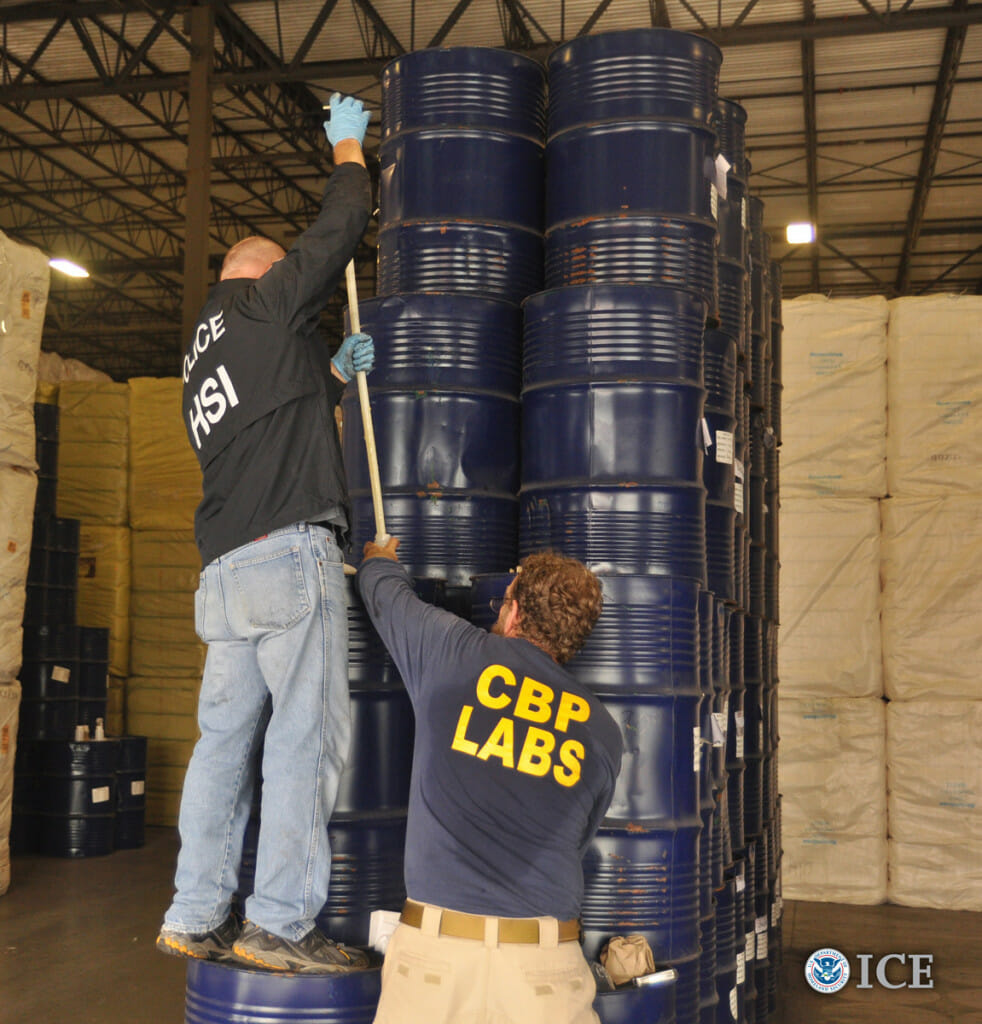Feds Seize $2 Million Worth of Illegal Chinese Honey
Immigration and Customs Enforcement seize nearly 450,000 pounds of illegal Chinese honey.
Feds Seize $2 Million Worth of Illegal Chinese Honey
Immigration and Customs Enforcement seize nearly 450,000 pounds of illegal Chinese honey.

Chinese companies are trying to get their sometimes sub-par products to the U.S. market while avoiding high tariffs. The honey that makes its way into the U.S. illegally can not only undercut fair market prices but can damage the product’s reputation with consumers.
Richard “Rich” Halverson, assistant special agent in charge of Homeland Security Investigations in Houston, says the city is becoming a “key point of entry” into the country for this honey.
In the latest bust, ICE obtained information about incoming shipments they believed contained honey originating from China. The smugglers used forged documents indicating the honey was from Latvia to try and hide its origins, says Halverson.
The investigation is ongoing and while Halverson doesn’t like to speculate how an individual case may conclude, he says if the situation warrants, they will bring the case to federal prosecutors and file charges.
“We always try to find the individuals responsible for illegal activity,” Halverson says.
The reason for all this cloak-and-dagger behavior is the hefty tariff on Chinese honey that was put in place in December 2001 by the U.S. Commerce Department. In the early 2000s, a number of companies involved in the U.S. honey industry filed suit against the Chinese, believing they were selling honey to the U.S. below the cost of their own production, making it “very difficult” for U.S. producers to compete, according to Jill Clark, vice president for sales and marketing at Dutch Gold Honey, one of the nation’s largest honey packers.

When the tariff was put into place there was a drop-off of honey originating from China, but before long, honey began pouring in from countries that hadn’t traditionally been big producers, including Malaysia and Indonesia. ICE got involved in 2008 and learned the honey was originating from China and being relabeled in other countries to try and circumvent the federal tariffs, Clark says.
Chinese honey’s reputation isn’t the best, especially after the U.S. Food and Drug Administration issued a warning in October 2002 over the concern some Chinese honey contained a broad-spectrum antibiotic not approved for use in the product.
“It’s very important to know where the honey originated from in order to ensure a quality product,” says Clark.
The U.S. produces about 150 million pounds of honey annually, but consumes about 450 million pounds, she says.
“We are a huge honey importing country,” says Clark.
Clark sits on the board of True Source Honey, an industry-supported, voluntary certification program that provides traceability from hive to table through outside auditors in an attempt to prevent illegal trade in honey.
Clark says thanks to ICE’s efforts, the current honey market for U.S. companies is in a much better position than it was five years ago.
Halverson wouldn’t venture a guess on whether ICE is seeing more or less of the illegal honey these days, but says it’s a crime that’s on their radar.
“It’s something we’re actively looking at,” he says.
Follow us
This work is licensed under a Creative Commons Attribution-NoDerivatives 4.0 International License.
Want to republish a Modern Farmer story?
We are happy for Modern Farmer stories to be shared, and encourage you to republish our articles for your audience. When doing so, we ask that you follow these guidelines:
Please credit us and our writers
For the author byline, please use “Author Name, Modern Farmer.” At the top of our stories, if on the web, please include this text and link: “This story was originally published by Modern Farmer.”
Please make sure to include a link back to either our home page or the article URL.
At the bottom of the story, please include the following text:
“Modern Farmer is a nonprofit initiative dedicated to raising awareness and catalyzing action at the intersection of food, agriculture, and society. Read more at <link>Modern Farmer</link>.”
Use our widget
We’d like to be able to track our stories, so we ask that if you republish our content, you do so using our widget (located on the left hand side of the article). The HTML code has a built-in tracker that tells us the data and domain where the story was published, as well as view counts.
Check the image requirements
It’s your responsibility to confirm you're licensed to republish images in our articles. Some images, such as those from commercial providers, don't allow their images to be republished without permission or payment. Copyright terms are generally listed in the image caption and attribution. You are welcome to omit our images or substitute with your own. Charts and interactive graphics follow the same rules.
Don’t change too much. Or, ask us first.
Articles must be republished in their entirety. It’s okay to change references to time (“today” to “yesterday”) or location (“Iowa City, IA” to “here”). But please keep everything else the same.
If you feel strongly that a more material edit needs to be made, get in touch with us at [email protected]. We’re happy to discuss it with the original author, but we must have prior approval for changes before publication.
Special cases
Extracts. You may run the first few lines or paragraphs of the article and then say: “Read the full article at Modern Farmer” with a link back to the original article.
Quotes. You may quote authors provided you include a link back to the article URL.
Translations. These require writer approval. To inquire about translation of a Modern Farmer article, contact us at [email protected]
Signed consent / copyright release forms. These are not required, provided you are following these guidelines.
Print. Articles can be republished in print under these same rules, with the exception that you do not need to include the links.
Tag us
When sharing the story on social media, please tag us using the following: - Twitter (@ModFarm) - Facebook (@ModernFarmerMedia) - Instagram (@modfarm)
Use our content respectfully
Modern Farmer is a nonprofit and as such we share our content for free and in good faith in order to reach new audiences. Respectfully,
No selling ads against our stories. It’s okay to put our stories on pages with ads.
Don’t republish our material wholesale, or automatically; you need to select stories to be republished individually.
You have no rights to sell, license, syndicate, or otherwise represent yourself as the authorized owner of our material to any third parties. This means that you cannot actively publish or submit our work for syndication to third party platforms or apps like Apple News or Google News. We understand that publishers cannot fully control when certain third parties automatically summarize or crawl content from publishers’ own sites.
Keep in touch
We want to hear from you if you love Modern Farmer content, have a collaboration idea, or anything else to share. As a nonprofit outlet, we work in service of our community and are always open to comments, feedback, and ideas. Contact us at [email protected].by Andrew Amelinckx, Modern Farmer
February 3, 2015
Modern Farmer Weekly
Solutions Hub
Innovations, ideas and inspiration. Actionable solutions for a resilient food system.
ExploreExplore other topics
Share With Us
We want to hear from Modern Farmer readers who have thoughtful commentary, actionable solutions, or helpful ideas to share.
SubmitNecessary cookies are absolutely essential for the website to function properly. This category only includes cookies that ensures basic functionalities and security features of the website. These cookies do not store any personal information.
Any cookies that may not be particularly necessary for the website to function and are used specifically to collect user personal data via analytics, ads, other embedded contents are termed as non-necessary cookies.